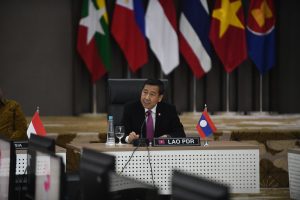Laos, the current chair of the Association of Southeast Asian Nations (ASEAN), has appointed a veteran diplomat as its special envoy to Myanmar ahead of the bloc’s foreign ministerial retreat in Luang Prabang later this month.
Citing an “informed diplomatic source,” Thai PBS reported on Sunday that Foreign Minister Saleumxay Kommasith had appointed Alounkeo Kittikhoun, a former vice minister for foreign affairs, as special envoy. The Lao Foreign Ministry has informed its ASEAN counterparts about the appointment of Alounkeo, who assumed the duty on January 1.
Alounkeo’s appointment comes as Laos’ government gears up to host the foreign ministers’ retreat in Luang Prabang on January 28-29, the first major meeting of its chairmanship.
Alounkeo brings a host of experience to the role of special envoy. He served as Laos’ permanent representative to the United Nations from 1993 to 2017, as vice minister of foreign affairs, and as Vientiane’s point-man for ASEAN affairs during the country’s last chairmanship in 2016. He was also the co-author along with his son Anoulak, the current chief executive officer of the Mekong River Commission (MRC), of the 2021 book “Small Countries, Big Diplomacy: Laos in the U.N., ASEAN, and MRC.”
As special envoy, however, Alounkeo has been saddled with a significant – and arguably impossible – challenge: pushing forward the implementation of ASEAN’s Five-Point Consensus peace plan. Established in April 2021, three months after the Myanmar military’s coup d’etat, the Consensus calls for the immediate cessation of violence and inclusive political dialogue including “all parties” to the country’s conflict, as well as the provision of humanitarian aid to populations in need.
The feasibility of these first two goals was questioned even at the time, but have since become surreally abstracted from the reality on the ground in Myanmar, where the military junta and a broad-based resistance movement are locked in a zero-sum struggle for the country’s future. In this context, the notion of a negotiated political solution that includes both the military and its broad coalition of opponents has been unrealistic, and underplayed the revolutionary intent of those fighting Myanmar’s military.
In some ways, the vagueness of the Consensus reflects the bloc’s divisions over how to respond to the coup and its turbulent aftermath, divisions which have persisted if not deepened in the nearly three years since. As last year’s ASEAN chair, Indonesia pushed for a more active ASEAN role, along with Malaysia and the Philippines, and held direct talks with members of Myanmar’s resistance, including the National Unity Government, over the junta’s protests.
But Laos has been firmly in the camp that saw any more active involvement in the conflict as a violation of ASEAN’s norm of “non-interference” in the internal affairs of member states. This will therefore place automatic limits on what its new special envoy can achieve in his role.
While Laos enjoys the benefits of hindsight regarding the Myanmar military’s obduracy and will be supported by last year’s chair (Indonesia) and next year’s chair (Malaysia) in crafting its approach to the country, the conflict there has now attained a momentum of its own that no outside power, let alone the congenitally cautious ASEAN bloc, is likely to arrest.
“Alounkeo is a quality, experienced diplomat, but I see no real prospect for ASEAN diplomacy to shape what happens next in Myanmar,” Scot Marciel, a retired U.S. diplomat, wrote yesterday on X (formerly Twitter). “The bloc is divided and has been pursuing ‘solutions’ that don’t reflect the reality of the Myanmar situation.”
Indeed, given recent battlefield developments, Laos should perhaps spend some time considering how the bloc might respond to a full-blown collapse of the military administration.

































